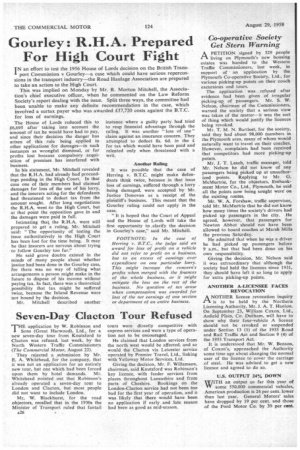Gourley: R.H.A. Prepared
Page 28

If you've noticed an error in this article please click here to report it so we can fix it.
For High Court Fight IN an effort to test the 1956 House of Lords decision on the British Trans' port Commission v Gourley—a case which could have serious repercussions in the transport industry—the Road Haulage Association are prepared to take an action to the High Court.
This was implied on Monday by Mr. R. Morton Mitchell, the Association's chief executive officer, when he commented on the Law Reform Society's report dealing with the issue. Split three ways, the committee had been unable to make any definite recommendation in the case, which involved a surtax payer who was awarded 07,720 costs against the B.T.C. for loss of earnings.
The House of Lords reduced this to £6,695 after • taking into account the amount of tax he would have had to pay, and since their decision the danger has arisen of this rule being applied in other applications for damages—in such instances as wrongful dismissal, or for profits lost because compulsory acquisition of premises has interfered with business.
In his statement, Mr. Mitchell revealed that the R.H.A. had already had proceedings pending in the High Court. In that case one of their members had claimed damages for loss of the use of his lorry, and the insurers acting for the defendants had threatened to deduct tax from the amount sought. After long negotiations the R.H.A. went to the High Court, but at that point the opposition gave in and the damages were paid in full.
Intimating that the R.H.A. were still prepared to get a ruling, Mr. Mitchell said: "The opportunity of testing the issue authoritatively in the High Court has been lost for the time being. It may be that insurers are nervous about trying to follow Gourley too far."
He said grave doubts existed in the minds of many people about whether justice had been done in the Gourley case, for there was no way of telling what arrangements a person might make in the future to dispose of his income without paying tax. In fact, there was a theoretical possibility that tax might be suffered twice, because the Inland Revenue were not bound by the decision.
Mr. Mitchell described another instance where a guilty party had tried to reap financial advantage through the ruling. It was another " loss of use" claim against an insurance concern. They attempted to deduct 8s. 6d. in the £ for tax which would have been paid and relented only when threatened with a Writ.
Another Ruling It was possible that the case of Herring v. B.T.C. might make defendants think twice, because in that issue loss of earnings, suffered through a lorry being damaged, were accepted by Mr. Justice Donovan as a receipt of the plaintiff's business. This meant that the Gourley ruling could not apply in the case.
"It is hoped that the Court of Appeal and the House of Lords will take the first opportunity to _clarify the decision in Gourley's case," said Mr. Mitchell.
FOOTNOTE: In the case of Herring v. B.T.C., the judge said an award for loss of profit on a vehicle did not refer to profit on a business, but to an excess of eamings over expenditure on one particular lorry. This might increase the concern's profits when merged with the finances of the whole business, or it might mitigate the loss on the rest of the business. No question of tax arose when compensation was awarded for loss of the net earnings of one section or department of an entire business.




























































































